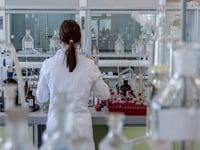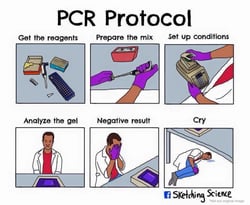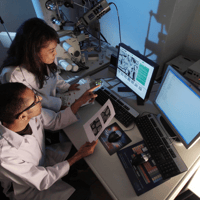 We’ve all been there…the experiment didn’t work for the 87th time, and the feeling of dread and impostor syndrome surrounds the mind as the seminar or thesis committee meeting looms. It’s easy to dwell on everything that isn’t working right at that moment, but there are scientific discoveries to be made, and someone has to do it, and it might as well be you! That’s easier said than done, but with the proper support mechanisms and some confidence boosts, your goals will be achievable.
We’ve all been there…the experiment didn’t work for the 87th time, and the feeling of dread and impostor syndrome surrounds the mind as the seminar or thesis committee meeting looms. It’s easy to dwell on everything that isn’t working right at that moment, but there are scientific discoveries to be made, and someone has to do it, and it might as well be you! That’s easier said than done, but with the proper support mechanisms and some confidence boosts, your goals will be achievable.
The Inevitability of Failure and Moving On
There is a commercial from way back when seared into my memory of basketball legend Michael Jordan talking about how he succeeds because he has failed so many times in his life. While research science may not be as exciting or as high stakes to folks outside of the laboratory, the message is still relevant, because success through discovery is derived from multiple failures before you can achieve and confirm the result you need that might one day change the world. As someone who has failed to produce results numerous times (albeit not to the scale of a Hall of Fame basketball player), I can relate to the feeling of redemption and triumph when the data points can finally be compiled to form a figure for the paper.
The thing with negative results and failures is that, instead of being mere obstacles or discouragements of your ability, they could become avenues for new insights and discussions. For example, rather than discarding old moldy plates as ruined experiments, Nobel laureate Sir Alexander Fleming was able to isolate and characterize the first widely available antibiotic. There is always some rationale behind a negative or unexpected result, whether it is due to a technical error (that can be repaired for the next round as a teachable moment) or because it belies a phenomenon that has yet to be revealed. And the experience of having to navigate that failure, and to grow from it, can lead you to new insights about yourself.
 Learning to cope with failure is a key experience for everyone, as exemplified by this professor who deliberately exposes her students to scientific failure. In this case, rather than feeling terrible that they were unable to generate the expected results, the students are learning resilience in the face of scientific snafus and how to work through them. In your own research, you will likely spend weeks attempting to perfect your PCR protocol, fight with buffer conditions in your Western blotting or ELISA experiments, and question your life choices. Scientific discovery is hard work, but while we have all learned this the hard way, we can at least be there to guide the next wave of great scientists in proper experimental techniques and interpretation of data so they can contribute to our growing knowledge base. The first step, though, is to understand that failure is natural and that does not reflect on your abilities or self-worth.
Learning to cope with failure is a key experience for everyone, as exemplified by this professor who deliberately exposes her students to scientific failure. In this case, rather than feeling terrible that they were unable to generate the expected results, the students are learning resilience in the face of scientific snafus and how to work through them. In your own research, you will likely spend weeks attempting to perfect your PCR protocol, fight with buffer conditions in your Western blotting or ELISA experiments, and question your life choices. Scientific discovery is hard work, but while we have all learned this the hard way, we can at least be there to guide the next wave of great scientists in proper experimental techniques and interpretation of data so they can contribute to our growing knowledge base. The first step, though, is to understand that failure is natural and that does not reflect on your abilities or self-worth.
You Are Not Alone
For the most part, when you are part of the scientific community, you should take advantage of everything that community has to offer, from secondary mentors beyond your principal investigator or your thesis committee, to all your fellow students and friends, and even mentors outside of your institution. Science is never done in a vacuum even if only two or three people are actually recognized with the big prize. The lifelong connections I have made with mentors and colleagues alike have helped me gain insight into research directions and even in my career, and it is just nice to know that there’s always a friend out there to lean on in good times and bad.
 Everyone needs a helping hand at some point, especially those who come from challenging backgrounds that they overcame for a chance to participate in science. Once you find that support system that helps you out of your rut, remember what you experienced and try to pay it forward by guiding those that come after you. In addition to advice on experimental technologies, you can also steer them away from problematic mentors and more towards good ones that will cultivate their curiosity and help them achieve success. As science is meant to improve the human condition, we also have a responsibility to ensure that the path of those that follow is not as rough as the one we once traveled.
Everyone needs a helping hand at some point, especially those who come from challenging backgrounds that they overcame for a chance to participate in science. Once you find that support system that helps you out of your rut, remember what you experienced and try to pay it forward by guiding those that come after you. In addition to advice on experimental technologies, you can also steer them away from problematic mentors and more towards good ones that will cultivate their curiosity and help them achieve success. As science is meant to improve the human condition, we also have a responsibility to ensure that the path of those that follow is not as rough as the one we once traveled.
Your Path is Not Set in Stone
Once upon a time, I dreamed of curing cancer and winning a Nobel Prize, but those days are gone. That does not mean I am a failure of a scientist, but rather that my skills are better suited in a support role rather than as the active researcher. Many times, I happen upon posts like this that discourage prospective scientists from pursuing a postdoctoral fellowship or even to go to graduate school. However, not everyone is the same, and as baseball has taught me, progress is not linear.
 There is no hard set rule that says you have to get your PhD, then do a postdoc, then become an academic professor to be a success. I am thankful that I got the opportunity to learn from so many great scientists and earn my PhD, but I am also thankful that I decided not to pursue a postdoc and got the life experiences I did in my career. On the other hand, I have seen many of my friends go into postdocs and achieve great things in their careers, some becoming tenure-track professors at great institutions, while others branched off into industry and even science policy. What this all means is that you don’t ever have to pigeonhole your career aspirations, but continue to explore yourself and do something that aligns with your strengths and passions.
There is no hard set rule that says you have to get your PhD, then do a postdoc, then become an academic professor to be a success. I am thankful that I got the opportunity to learn from so many great scientists and earn my PhD, but I am also thankful that I decided not to pursue a postdoc and got the life experiences I did in my career. On the other hand, I have seen many of my friends go into postdocs and achieve great things in their careers, some becoming tenure-track professors at great institutions, while others branched off into industry and even science policy. What this all means is that you don’t ever have to pigeonhole your career aspirations, but continue to explore yourself and do something that aligns with your strengths and passions.
The way I’ve always thought about the PhD process is that it teaches you how to think and solve problems, and then what you decide to do with that skillset is up to you. In many cases, people who persist to earn their PhDs can do something they are passionate about and help humanity in their own way without becoming an academic, although I hope new prospective science majors consider going into academia so we can continue to have great mentors for the next generation and beyond. It is good to build character and resilience, and we know that the path to scientific discovery is hard, but let’s facilitate better support systems and recognize the importance of mental health so we can make it just a tiny bit easier for everyone going forward.




